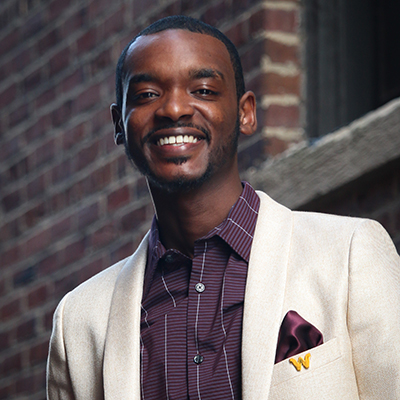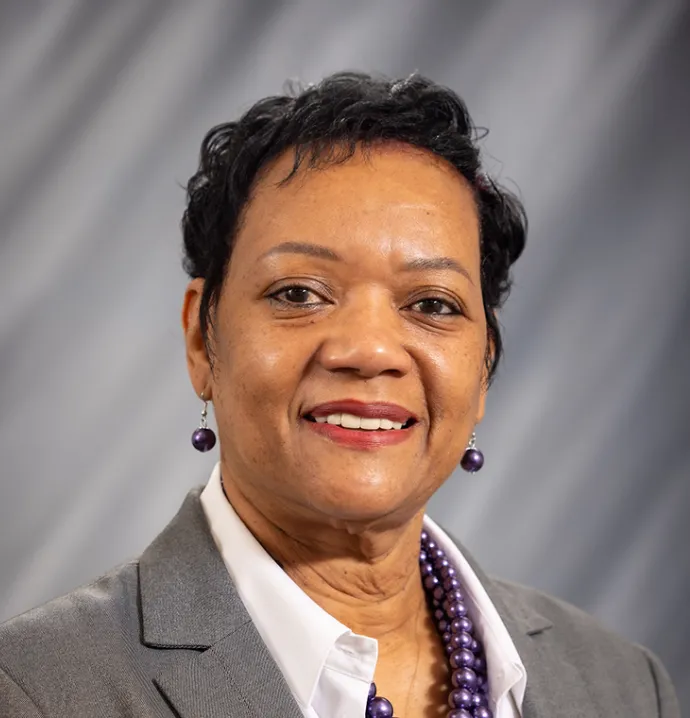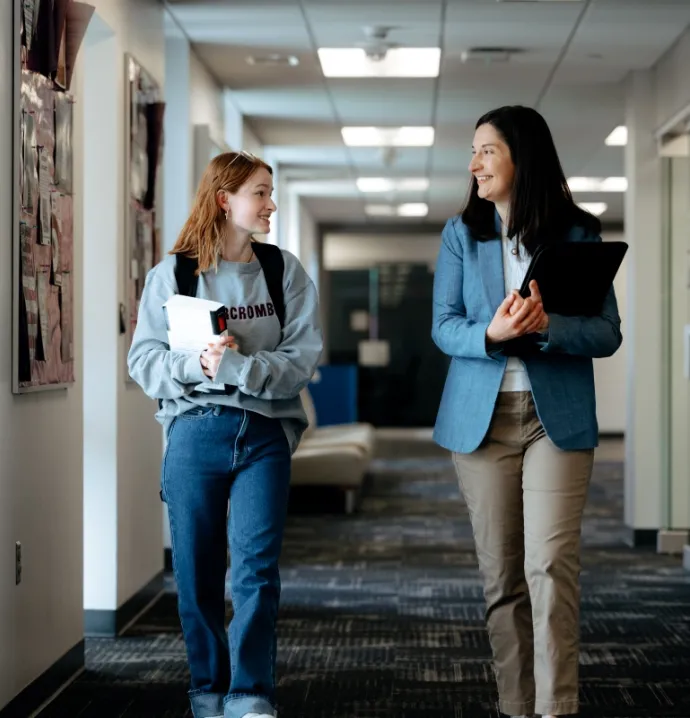UNI alum spreads love for local foods, revitalizes Waterloo farmer’s market
UNI alum spreads love for local foods, revitalizes Waterloo farmer’s market
Ever since he was a child growing up in northeast Waterloo, DaQuan Campbell enjoyed being in his family’s garden.
Today, the University of Northern Iowa business management alum (‘19) has used that passion for local foods to revitalize the Waterloo Urban Farmer’s Market and start a new venture to provide affordable produce. Campbell got there by combining his experiences growing up in a neighborhood where food could be scarce with the business and leadership skills he gained at UNI.
“I never wanted to go out and have a business that was just about making money,” Campbell said. “I wanted to make sure it had an impact on the community, and I thought local food was a way to tap into both of those.”
After thriving in the 1980s and 90s, the Waterloo downtown farmer’s market had fallen on hard times. It began to fragment into smaller midweek markets, which accelerated its decline. But since Campbell took over in 2018, the market has thrived, growing from about 15 vendors to more than 40, with foot traffic expanding from about 300 every Saturday to over 1,000.
“The Waterloo Urban Farmers Market led by DaQuan has seen a recent renaissance with renewed interest from customers, farmers and other vendors,” said Tavis Hall, executive director of Experience Waterloo, a tourist information center focused on promoting the city. “The out-of-the-box thinking of DaQuan and the board of directors has resulted in a fresh take on fresh produce and beyond.”
On any Saturday morning, Campbell can be found moving among the market’s vendors at Riverloop Expo Plaza, pointing customers in the right direction for certain items and overseeing the activities he plans, which often include arts and crafts designed for children. During the week, he stays busy communicating with the vendors, helping them understand the requirements for selling items at the market or assisting them with sales best practices. He also creates marketing materials and lines up food trucks. This year, he was able to bring in the Cedar Valley Fish Market, which sells both cooked and fresh fish.
“You just have to be flexible, because every week is different,” Campbell said.
At UNI, Campbell got involved with the UNI Local Food Program, which hires UNI students to help further their understanding of the local food system by working with local farmers and markets. He took leadership roles in the College Hill Farmers Market, the Local Food and Film Festival and the Food Crawl, while also serving as an AmeriCorps member.
“Daquan has always had a passion for local foods and his community,” Jodie Huegerich, UNI Local Food Program manager. “He has used his knowledge from being a UNI student employee to become a dedicated and successful market manager and business owner."
Campbell said his experience with the Local Food Program shaped what he wanted to pursue after graduation, and the skills he learned in UNI’s business college, such as communication and leadership strategies, helped him grow the farmers market.
“I really took a lot from my Organizational Leadership Class, which helped me understand how a leader can get people unified around a vision and work towards a common goal,” Campbell said. “That’s something that stuck with me from UNI and it’s something I apply in my job every day.”
He also brings his childhood experience witnessing food insecurity and growing up in a family that prioritized self-reliance.
“There were times when meals were hard to come by, not only for my immediate family, but for those around us,” Campbell said. “It was much easier to get cakes and candy from the local convenience store than it was to get fresh produce.”
Downtown Waterloo has been identified by the U.S. Department of Agriculture as a food desert, meaning the poverty rate is higher than 20% and one-third of its population lives more than one mile from a supermarket or large grocery store. In all, almost 20,000 people in Black Hawk County are food insecure, meaning they lack reliable access to a sufficient quantity of nutritious food, according to the Iowa State University Extension and Outreach.
Campbell’s family always emphasized the importance of having a garden, and Campbell saw how much it lessened the burden of food insecurity.
“My family members really understood the importance and power behind growing your own food and how that could uplift your community,” Campbell said. “As a family, we had some of our best times either in the garden or around the dinner table. Food really played a role in us being a close-knit family.”
Family was one of the reasons Campbell transferred to UNI in 2017 at the beginning of his junior year after stints at Iowa State University and a community college in Minnesota.
“I wanted to be closer to home and I valued UNI’s business program, which I thought was the best in the state,” Campbell said. “It was a perfect opportunity to bring it all together - be closer to home and learn from the best.”
And Campbell keeps his eye on the future, while looking to alleviate food insecurity issues in the neighborhood where he grew up - the Fourth Ward of Waterloo, an area in northeast Waterloo that has struggled with poverty and vacant buildings.
His latest venture is the We Arose Co-op. The co-op’s main focus is food delivery through the Greens to Go program, a program from UNI’s Center for Energy and Environmental Education. Through a partnership with local growers, the project’s staff goes to area farms and picks produce and then sells it at-cost the same day at a mobile produce stand.
“We're all mission driven, community oriented, and focused on doing all that we can to make sure that we're increasing access to fresh produce in areas that lack access to fresh produce,” Campbell said.




